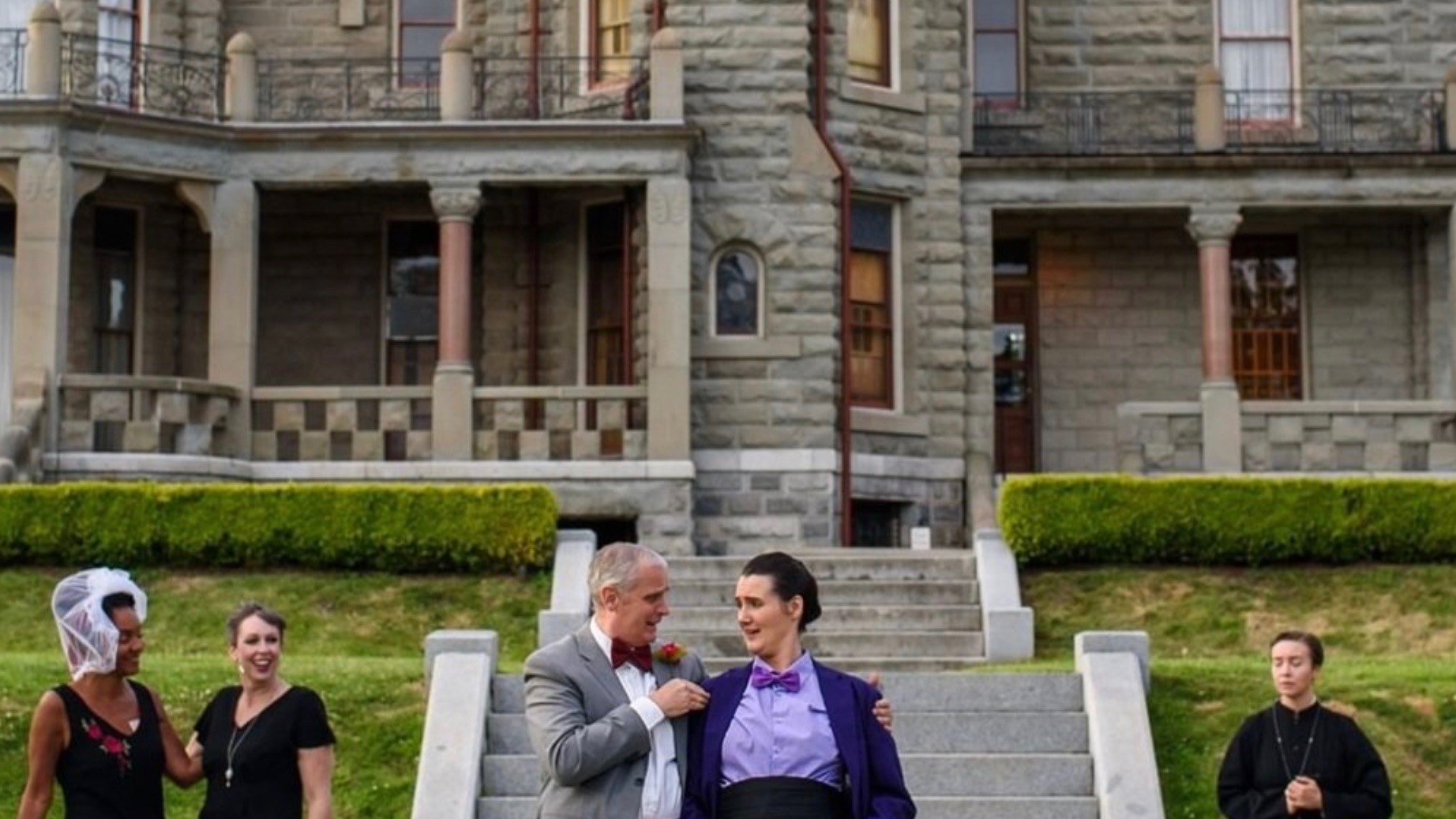Why read Shakespeare when you can watch his work performed so well?

Photo via Greater Victoria Shakespeare Festival website
This season of the Greater Victoria Shakespeare festival features the comedy Much Ado About Nothing; a delightful retelling of one of Shakespeare’s stand out comedies.
The Greater Victoria Shakespeare festival is hosted outdoors at Craigdarroch Castle and Lampson School Field. The actors’ performances are highlighted by the simple outdoor set. Being outside, the actors must project more than usual over the occasional passing car; but this just enables bigger expressions and reactions to be seen and heard. And everyone does a fantastic job. The love that those on and behind the stage have for the material is evident.
The plot follows two romantic pairings. The first: Claudio and Hero, a love-at-first-sight couple, nearly thwarted by our villain, Don John. The second, the main draw of Much Ado About Nothing: Benedick and Beatrice.
Neither Benedick nor Beatrice want to get married at the beginning of the play, especially not to each other––but since it’s a romantic comedy, their eventual union is inevitable. Throughout the play, they are constantly sniping at each other. Their banter is the heart of Much Ado About Nothing. It is so much fun to see the pair at one another’s throats. Much of the play’s comedy is drawn from their relationship.
“She’s very bold and witty,” Rosemary Jeffery, the actress that plays Beatrice, says of her character. “Yet she does allow herself to show us her vulnerability. When she finds out that Benedick loves her through trickery, she shifts to show that other side of her.”
“He’s very clever, very quippy,” says Ian Case, the actor who plays Benedick, about his character. “He has beautiful language because it’s quite intricate. He’s very much a fool. He’s very changeable emotionally. He has the full range of being very serious to goofy.”
It’s a delight to see these character dynamics change throughout the play. Jeffry and Case have fantastic chemistry with each other as actors, and they play that quintessential switch from arguing to good-natured bickering perfectly. Together, they are funny, they are petty, they carry themselves like they are above the drama, then fall hard in love. It’s the classic will-they-won’t-they, a light enemies-to-lovers done entertainingly well.
When asked what it was like to return to the festival after nine years, Michelle Morris, who played Don Pedro, said, “The camaraderie that’s formed amongst the acting company … is always a joy.” This joy is palpable as an audience member. Jeffery, Case, and Morris also enjoyed working with the company. “We’ve got a range of ages, a lot of diversity, different perspectives, and everybody’s giving it their all––and really talented.” said Case.
Besides the cast’s talent and the electricity of an outdoor performance, you may still be wondering: more than 400 years after the play’s first production, why see Shakespeare?
Because an integral aspect of theatre, especially Shakespearean theatre, is the audience itself.
“[Shakespeare] writes in a tradition where people speak directly to the audience. You don’t pretend that they aren’t there,” said Morris. “Every cough, every grandpa falling asleep or little kid saying ‘Hey Mom, what’s happening now?’ you’re meant to acknowledge that in the tradition of Shakespeare; you aren’t meant to pretend that they’re not there.”
The audience is included in the performance, both through participation or direct address. I myself volunteered to help catch Don John’s lackeys. We’re included in the jokes and the drama. The actors play off our reactions. It’s an active conversation.
“Having an audience and getting to share all our hard work with them… it really is all for them. If you’re not doing it for your audience, what are you doing it for?” said Morris.
If you’re worried about understanding the old English, take my word that you’ll actually adapt quite quickly. At the core of Shakespeare’s jokes are universal truths about interpersonal relationships––not references to old English society that require a university degree to figure out.
“The beautiful thing about Shakespeare,” said Case, “is that it’s open to interpretation. Directors will constantly set it in different settings. People [provide] these new interpretations of the play, the settings, and the characters, and that keeps it alive.”
You’ve probably seen a few Shakespeare adaptations before, or media that is loosely based on the plays, such as Anyone but You or The Lion King.
Half the fun of watching Shakespeare is seeing the take this production has on the material. How this Beatrice will deliver the line, “If I were a man, I would eat his heart in the marketplace”? With cold, calculated rage, in a shocking sudden drop away from light-hearted barbs. How this Benedick will comedically hide from Don Pedro and Claudio as they obviously set him up to fall for Beatrice? From behind a tree, but with delightfully exaggerated expressions and Don Pedro telegraphs each word.
“The characters that [Shakespeare] creates, they’re really rich,” said Jeffery. “He creates really complex characters. Mainly, it’s the way he uses universal themes with a twist. … His work appeals to so many people.”
This outdoor play is the perfect summer experience. Go with a friend, bring some snacks for a picnic, and enjoy the show.
Much Ado About Nothing is running until July 20. Tickets can be purchased through the Greater Victoria Shakespeare Festival website.






